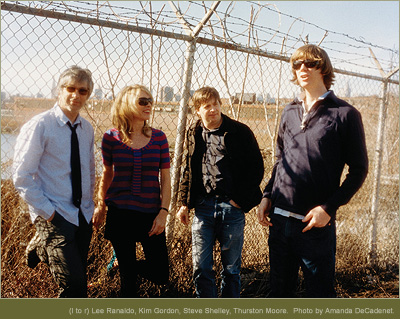

On June 22nd, the stars had aligned to make a super lame night. I was about to see Sonic Youth, my all-time favorite band (since sixth grade, I swear), but my friends had flaked, the ticket was gone, and I didn't have enough cash to pay for a damned t-shirt. I stormed into Warehouse Live alone and upset, twenty-five dollars poorer, and convinced the night would amount to jack crap.
Until Kim Gordon appeared onstage.
Draped in a shimmering, pink satin dress, she was brazen but happy and ready to pounce. I thought nothing of it as she fiddled with her mic as hubby Thurston Moore and fellow bandmates Lee Ranaldo and Steve Shelley casually ambled onstage. A few moments into their banal meandering, chord un-tuning, and amp un-adjusting, I noticed that the swarm of happy couples around me had stopped making out to merely watch the band tune amps. Even the rest of the crowd had fallen silent, and then I started to rethink what the hell I was seeing.
The lights had dimmed and a wonder had grown; suddenly it felt as if the crowd was entranced. People started to call the band's names. They waved in their direction, and frantically took snapshots on their cells. Then it finally hit me: I was watching a legend -- alive and awash in its sublime, art-punk glory. It finally struck me: Sonic Youth was here. Those boring amps were being tuned just for me. To hell with the t-shirt and the twenty-five bucks.
From the second they blast into the airy flush of "Reena," the debut track off of their just-released album Rather Ripped, the audience was sent careening into the stars. A veil had been lifted, and everything pulsed, from Gordon's shaky vocals to the hiss of the amps. "Eric's Trip" followed, with Ranaldo on lead guitar, a sight that incited some shrieks and nodding heads of approval. It weaved and meandered just as I remembered, exactly as jaded as the recording itself.
From here each song swelled into the next, igniting a soundscape of dreamy transcendence. The guitars oscillated between jangly and crass, with moments of transcendence punctuated by howls. I was hearing the world as Sonic Youth felt it, lush in its beauty, strangeness, and flaws. Hazy new songs like "Pink" and "Or" describe this perfectly, whereas beloved tracks off of the treasured Goo and Dirty albums put things in perspective with their angst-driven snarl.
All of these songs were fresh and for real; they sounded as though they were made on that night. The raw intensity of songs I'd played obsessively since I was a flannel-wearing, antisocial teenager was still in full effect. They could withstand the threat of any crappy music; syrupy ballads, saccharine hip-hop, and even the Pussycat Dolls (whom Gordon caustically referenced in the feminist anthem "Kool Thing") couldn't stand a chance. Hits off of Goo and Washing Machine still resounded as harshly as the day they were first played.
There was a moment or five when the band hit crescendos, so loud and intense that the room might have throbbed. The band stood together in perfect alignment, ripping away at their guitars in unison. Some outsider must have thought it was noisy, but inside, it was beautiful. It was everything the audience and the band had always felt. END LINKS:
Sonic Youth -- http://www.sonicyouth.com/; Geffen Records -- http://www.geffen.com/;
Warehouse Live -- http://www.warehouselive.com/
|